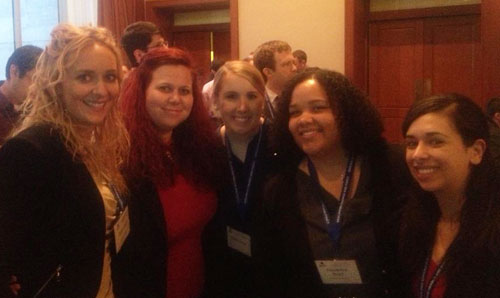
The University of Arkansas was well-represented at the recent annual meeting of the Association for Education Finance and Policy, with faculty and doctoral students presenting a total of 22 unique papers and posters. The total was one less than Stanford University, five more than Columbia University (including Teachers College) and 10 more than Harvard University.
However, when James Shuls, a doctoral student in education policy, counted first authorships and co-authorships on a paper or poster, discussants and session chairs, he found Arkansas with 44, Stanford with 39, Columbia with 29 and Harvard with 27.
Shuls created what he called a presence ranking for the meeting that was March 14-16 in New Orleans.
“By my estimation, the University of Arkansas has the largest presence of any university at the conference,” Shuls said. “Scholars from the University of Arkansas were the lead author of 14 papers. All of the co-authorships for Arkansas were on papers that also had an Arkansas first author. At the other three universities, scholars appeared as co-authors on papers where the lead author was from a different institution.”
All of the Arkansas papers were generated by the department of education reform, an academic department created in the College of Education and Health Professions in 2005. The department’s mission is to advance education and economic development in Arkansas and nationwide by focusing on the improvement of K-12 schools.
It has five endowed faculty chairs: Robert Costrell, Twenty-First Century Chair in Education Accountability; Jay Greene, Twenty-First Century Chair in Education Reform and department head; Robert Maranto, Twenty-First Century Chair in Leadership; Gary Ritter, Twenty-First Century Chair in Education Policy; and Patrick Wolf, Twenty-First Century Chair in School Choice. Reed Greenwood, former dean of the College of Education and Health Professions, also holds a faculty appointment in the department, and one faculty chair in teacher quality is open.
The association’s journal, Education Finance and Policy, published two articles by the Arkansas scholars last year: “Is the Juice Worth the Squeeze? A Benefit/Cost Analysis of the District of Columbia Opportunity Scholarship Program,” by Wolf and Michael McShane and “The Medium-Run Effects of Florida’s Test-Based Promotion Policy,” by Marcus Winters and Greene.
The department offers a doctoral degree with the first cohort of students now in its fourth year. Four of those students have already found jobs: James “Lynn” Woodworth, a research associate with the Center for Research on Educational Outcomes at Stanford University; McShane, a research fellow with The American Enterprise Institute; Shuls, an education policy analyst with The Show-Me Institute; and Stuart Buck, director of research and strategic litigation counsel with The Laura and John Arnold Foundation.
Contacts
Heidi Wells, director of communications
College of Education and Health Professions
479-575-3138,